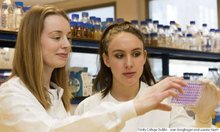Dublin researchers discover way to prevent infections on medical devices
Researchers at Trinity College Dublin have discovered a way to prevent bacteria from growing on medical devices that are implanted in the human body.
The researchers state the discovery is a step towards developing new preventative strategies that could help patients recover in the aftermath of a surgical operation.
Medical devices implanted into patients can become compromised when a collection of bacteria called ‘biofilms’ become attached to the surface.
These bacteria, called ‘staphylococci’ grow on catheters, heart valves and artificial joints and can avoid being killed by antibiotics and the human immune system. Because of this, the medical devices often have to be removed and replaced, costing the healthcare system €50,000-€90,000 per incident.
The researchers, alongside the Université Catholique de Louvain and Leanne Hays, a PhD student in Trinity’s Department of Microbiology, found that it is possible to stop bacteria attaching to surfaces and to each other by using a small blocking molecule.
The target of the blocking molecule was a protein attached to the surface of the bacteria called ‘SdrC’. In laboratory experiments the blocking molecule prevented the SdrC protein from recognising other bacteria, which stopped the staphylococci from growing as biofilm communities.
Dr Joan Geoghegan, assistant professor of Microbiology in Trinity’s School of Genetics and Microbiology led the project. She said: “These new findings show that it is possible to stop bacteria from building communities using molecules that specifically target proteins attached to the surface of the bacteria. This exciting breakthrough will inform the design of new, targeted approaches to prevent biofilm formation by staphylococci and reduce the incidence of medical device-related infection.”







